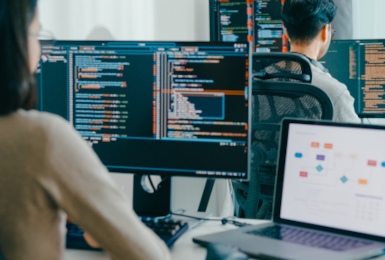Similar to its weather phenomenon counterpart, the digital cloud hangs over us, holding onto vast amounts of data like raindrops. In the information technology industry, the cloud is defined as a massive network of remote servers that store and process data for the devices that we use every day. When you take a photo and store it on a remote server so it doesn't take up space on your phone — you've just put your image in the cloud.
Cloud environments have become the standard in the modern era, which has led to an increase in cloud-based cybercrime. The field of cloud forensics is a digital forensics specialty, allowing experts to develop the advanced skills required to uncover digital evidence from the cloud and assist with cloud-based cybercrime investigations.
What Is Cloud Forensics?
According to research published in the peer-reviewed journal Sensors, cloud digital forensics is defined as a specialized field that handles cybercrime investigations for incidents that occur in cloud-based environments. Due to the vast nature of the cloud and the complexity of the rapidly expanding cloud-based landscape, this field requires precision and agility. The methods and techniques used to investigate cloud-based cybercrimes continue to evolve, almost as quickly as the technology itself.
Importance of Cloud Forensics in Modern Cybercrime Investigations
The sheer size and scope of the cloud calls for experts to take a specialized approach to modern cybercrime investigations. In many cases, cloud forensics investigators are navigating multi-jurisdictional cases in which it can be difficult to understand who owns the data, how it should be collected, and how it should be preserved. Through specific investigation techniques and methodologies, these experts can fairly investigate these incidents.
Key Challenges in Cloud Forensics
The digital forensics field is inherently complex, but there exist distinct challenges in cloud forensics that investigators need to navigate when working in this specialized sector of digital forensics. According to research published in the Computers journal, the following are some of the primary challenges in cloud forensics:
Data Ownership and Jurisdiction
Data structures in the cloud are notoriously intricate, and most cloud environments are multi-jurisdictional. Therefore, cloud forensics investigators may have a difficult time determining who owns the data in question. As cloud environments evolve, this is expected to be a more pressing obstacle in the field.
Evidence Volatility
Cloud environments are remarkably dynamic, meaning that the evidence contained within these environments can quickly be changed or altered. For cloud forensics investigators, this is challenging because they may have a difficult time identifying and preserving data evidence for their investigations.
Limited Access and Control
Cloud forensics investigators are at the mercy of the jurisdiction that is managing and maintaining the cloud-based server. In many cases, these are multi-jurisdictional environments; thus, investigators may find that they have limited access to these servers or minimal control over the quality of evidence that is available.
Cloud Forensics vs. Digital Forensics
Digital forensics is defined by IBM as a specialized branch of forensic sciences that deals with the investigation of cybercrime as well as the criminal and civil investigations that involve digital evidence. The scope of the digital forensics field is broader, whereas the cloud forensics field focuses specifically on cybercrime investigations involving cloud platforms.
Steps in a Cloud Forensic Investigation
As noted within the Computers research, the following are steps involved in a cloud forensics investigation:
Identification and Preservation
Investigators must begin the process by scouring cloud environments and identifying data evidence that may be relevant to their case. Additionally, they must make efforts to swiftly collect the evidence and preserve it, as cloud-based evidence is particularly volatile and can quickly change.
Collection
Along with collecting and preserving evidence from the cloud server itself, cloud forensics investigators also have to work to collect evidence that may be related to any data breaches. As part of this process, investigators work to audit activity that has occurred in the cloud and identify any unauthorized points of access.
Examination and Analysis
Once this delicate evidence has been collected and preserved, cloud forensics experts must begin the process of examining and analyzing it. Throughout the analysis process, investigators may begin to develop an idea of who the suspect may be in the case.
Reporting and Presentation
After the data has been collected and the analysis is complete, cloud forensics investigators are responsible for reporting the information they have available. In many cases, they will present their findings to law enforcement officials, legal experts, or a jury that is presiding over a court case. That’s why it's imperative for all reporting and presentations to be as clear and accurate as possible — enabling anyone at any level of expertise to understand the breadth and depth of the cybercrime that has occurred in the cloud environment.
Tools and Technologies Used in Cloud Forensics
Due to the dynamic nature of cloud environments, advanced tools and technologies are required. Examples of the leading tools and technologies used in cloud forensics include:
- Log analysis tools are used to review user behavior and activity on a cloud server.
- Snapshot and imaging tools help create forensic images for evidence.
- Forensic suites are technology platforms that provide forensics professionals with the comprehensive set of digital tools required to conduct an investigation.
- API forensic tools are particularly important in cloud forensics because they allow investigators to access and collect data from cloud-based servers.
Skills Required for Cloud Forensics Professionals
Those who are interested in working in the cloud forensics field will want to focus on developing the following skills:
Cloud Computing Expertise
The vast size and dynamic nature of cloud environments make them difficult for most people to navigate, necessitating cloud forensics specialists to have extensive cloud computing expertise.
Knowledge of Digital Forensics Principles
In addition to developing advanced expertise in cloud computing, cloud forensics experts must be acutely aware of the principles that guide the broader field of digital forensics.
Legal and Compliance Awareness
Cloud forensics experts are required to remain in compliance with all legal and regulatory standards when conducting their investigations — as well as aware of the ever-evolving compliance guidelines and laws.
Analytical Thinking
Beyond the advanced technical skills that cloud forensics experts need, they must focus on core competencies, too, such as critical thinking and analytical thinking. It's essential for cloud forensics specialists to know how to assess and evaluate data within the context of the investigation.
Technical Certifications
In some cases, cloud forensics experts must pursue technical certifications in order to grow and advance their careers. These certification programs enable professionals to develop new skills and specialize in niche areas of the field.
Certification for Cloud Forensics
These are a few of the certification programs that cloud forensics experts may consider:
- Certified Cloud Security Professional (CCSP) – Globally recognized as a premier cloud security credential, the CCSP credential is offered through ISC2.
- AWS Certified Security - Specialty – Designed for cloud forensics specialists who may work with the Amazon Web Services cloud server, the AWS Certified Security - Specialty credential is an ideal way to specialize in the field.
- GIAC Cloud Forensics Responder (GCFR) – Focusing on log collection and analytical skills, the GIAC Cloud Forensics Responder credential allows you to prove your proficiency in navigating the servers of the three main cloud providers.
Future of Cloud Forensics
While the nature of cloud environments may continue to change in the coming years, organizations of all sizes are expected to remain heavily dependent on these servers. In turn, the number of cybercrime incidents that take place on cloud-based servers will only rise, alongside the demand for cloud forensics experts.
Become an Expert in Digital Forensic Investigations at Champlain College Online
In a world where vast amounts of data are stored online and an increasing number of tasks are completed in the cloud, the need for digital forensics experts has never been greater. At Champlain College Online, we offer an online Bachelor of Science in Computer Forensics & Digital Investigations, allowing students to develop an advanced understanding of the leading forensics techniques used to uncover digital evidence and help solve cybercrimes. Request more information about our online degree programs today.
Download Program Guide
Learn what you can expect from our online bachelor's in computer forensics & digital investigations program.

Download Program Guide
I acknowledge that, by clicking the "submit" button, I am giving my express written consent to Champlain College and its representatives to contact me about educational opportunities via email, text, or phone, at the phone number above, including my mobile phone, using an automatic dialer, or pre-recorded message. Message and data rates may apply. I understand that my consent is not a requirement for enrollment, and I may withdraw my consent at any time.






